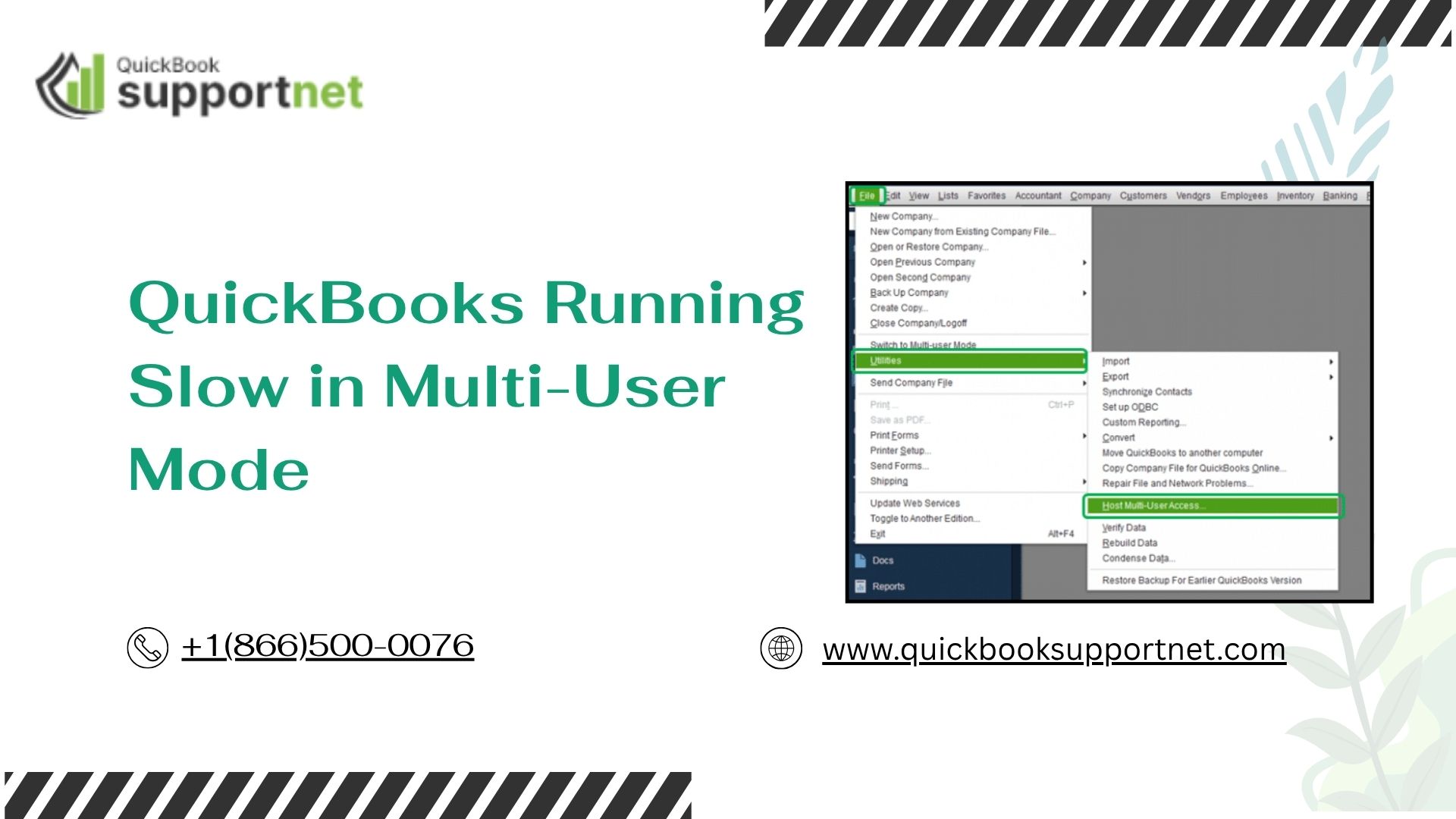Experiencing sluggish performance in QuickBooks while working in a multi-user setup? It’s frustrating when accounting tasks crawl, especially during payroll or invoicing hours. If QuickBooks Running Slow in Multi-User Mode is disrupting your operations, you’re not alone.
This detailed guide walks you through the reasons behind the slowdown, practical troubleshooting tips, expert-approved solutions, and real user feedback. Whether you're running QuickBooks Desktop in a hosted environment or across a local network, we’ve got the fixes you need to optimize performance and prevent future lags.
Troubled by QuickBooks Running Slow in Multi-User Mode? Learn proven solutions or call +1-866-500-0076 for expert help now.
Common Symptoms of QuickBooks Lag in Multi-User Mode
You may notice:
Delays in opening company files across the network.
Transactions take longer to save.
QuickBooks freezes when switching between windows.
Performance improves in single-user mode but drops in multi-user setup.
Why Is QuickBooks Slow in Multi-User Mode?
Several underlying causes can trigger performance issues when QuickBooks is accessed by multiple users simultaneously.
Primary Reasons Include:
Outdated QuickBooks Version – Older builds often lack optimizations.
Low Server or Workstation Specs – Insufficient RAM or CPU power hampers multitasking.
Network Congestion – Heavy traffic or weak Wi-Fi connections slow down file sharing.
Incorrect Hosting Configuration – Misconfigured Database Server Manager.
Antivirus or Firewall Interference – Security tools may block QuickBooks components.
Large Company Files – Bigger files mean longer read/write times.
How to Fix QuickBooks Running Slow in Multi-User Mode
Let's dive into the best ways to troubleshoot and fix the lag in your QuickBooks network environment.
1. Upgrade Hardware Resources
Ensure your server and workstations meet or exceed Intuit’s recommended specs:
Minimum 8 GB RAM (16 GB recommended)
SSD drives for faster read/write speed
Wired Ethernet instead of Wi-Fi for stability
2. Update QuickBooks and Windows
Open QuickBooks > Go to Help > Update QuickBooks Desktop
Select Update Now and complete the update.
Also, ensure your Windows OS is fully updated.
3. Use QuickBooks Database Server Manager
Install QuickBooks Database Server Manager on the host computer.
Open the Tool and Scan the Folder containing your company file.
Ensure Hosting is turned ON only on the server and OFF on all workstations.
4. Limit Background Apps and Network Load
Close unused programs on all workstations and schedule heavy data tasks during off-peak hours. Avoid streaming, large downloads, or cloud syncs during business time.
You can also consider visiting this guide on QuickBooks Delivery Server Down if you’re facing email or delivery issues in parallel with performance lags. These two issues often stem from the same root causes.
5. Reduce File Size and Perform Condense
Use File > Utilities > Condense Data to remove audit trail data.
Alternatively, archive older transactions to reduce database size.
6. Configure Firewall and Antivirus Properly
Add QuickBooks ports and services as exceptions to your firewall and antivirus. Also, allow access for:
QBW32.exe
QBDBMgrN.exe
IntuitSyncManager.exe
7. Switch to QuickBooks Hosting or Cloud Version
If your business demands faster performance with scalability, consider hosting QuickBooks Desktop in the cloud. This ensures faster file access across users and eliminates dependency on LAN setups.
Real User Experiences
Linda R., Ohio: "We were stuck with 5-minute delays every time someone clicked Save. QuickBooks support helped us reset our server settings — now it runs like new."
Dave M., New Jersey: "Upgrading to SSD and increasing our RAM drastically improved speed. Condensing the company file helped too."
Janet T., Texas: "Their technician walked us through disabling hosting on all workstations. That one step fixed our QuickBooks freezing problem!"
Frequently Asked Questions (FAQs)
1. Is there a specific QuickBooks version best for multi-user mode?
QuickBooks Desktop Premier or Enterprise are optimized for multi-user environments, especially for teams with 5+ users.
2. Can antivirus really affect performance?
Yes. Overprotective firewall settings or real-time scanning of QB files may delay QuickBooks functions. Always whitelist QuickBooks components.
3. How do I know if my network is the problem?
Run the QuickBooks Network Diagnostic Tool from Tool Hub. It scans and identifies network latency, configuration, and permission issues.
4. How many users can access QuickBooks at once?
That depends on your license. Pro allows 3, Premier allows 5, and Enterprise supports up to 30 simultaneous users.
5. Can using wireless networks slow down QuickBooks?
Absolutely. Wi-Fi signals fluctuate more than wired connections, making it risky for large company files shared over a network.
Final Words
If QuickBooks Running Slow in Multi-User Mode is interfering with your business performance, don’t let it delay your accounting tasks any longer. With the above solutions—from software updates to network optimization—you can bring back the speed your team needs.
And if you're still stuck, don’t hesitate to call +1-866-500-0076 for immediate technical assistance.
Read More:https://quickbooksupport-net.nicepage.io/blog/how-to-unfreeze-quickbooks-desktop-step-by-step-support-guide.html

